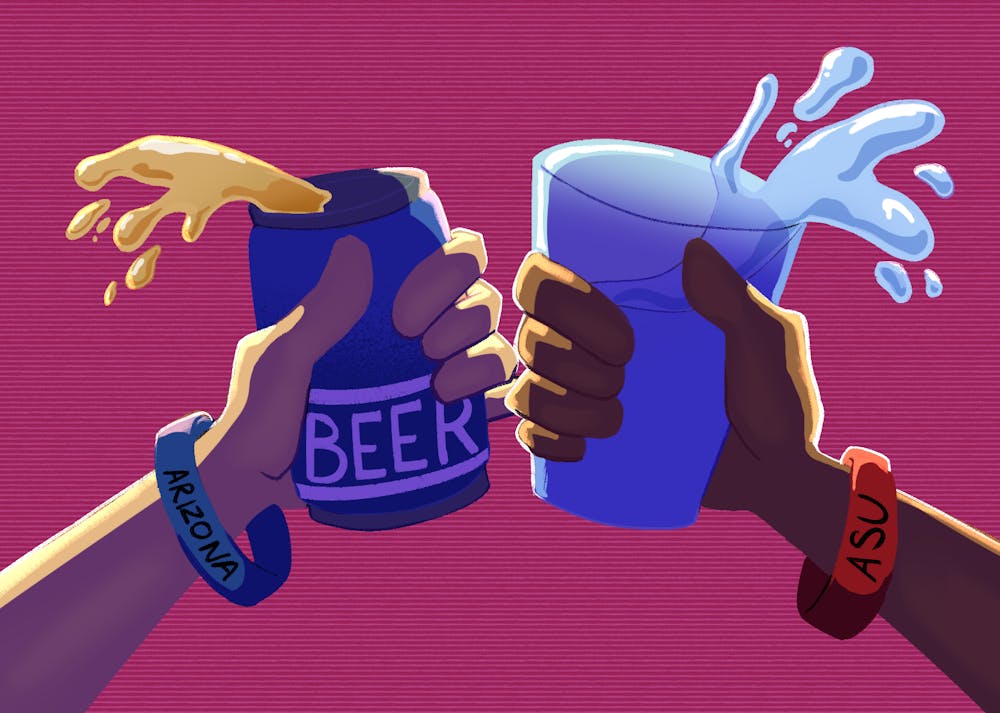When I think of college students, I think of a few things: sober living, responsible choices and monogamy. That’s why I chose Arizona State University. It makes complete sense that the University would dictate a dry campus. Banning something entirely has always worked. We all know that’s why the prohibition worked so well.
Sure, there are plenty of liquor stores and bars on University Drive, but we college students avoid those because we’re usually out drinking SunnyD and playing hopscotch. I have no clue which liquor stores don’t ID around here. Don’t ask me, because I don’t know. None of us know. We don’t drink, remember? Alcohol who?
This policy is especially effective in off-campus housing options. The fraternity houses on our makeshift Greek Row are as dry as a sober living complex. Just last weekend I saw a cop bust a party for having too much fun playing "Just Dance" and braiding each other’s hair.
And the best part of this dry campus policy? The numbers prove it works. According to a poll conducted by the University, 47.2% of ASU students do not drink alcohol, and 80.6% of ASU students do not use cannabis. We all answered that poll honestly, especially because the survey was conducted by the very University we pay to attend.
"But Claire,” you say, “The poll is anonymous! There’s no incentive to lie!” And to that, I say: Is anything actually anonymous anymore? We live in the era of sticky notes over web cameras, nobody is going to self-report their alcohol use to a school. Do you actually think any one of us is telling the truth? Sure, Michael Crow, 47.2% of students don't drink any alcohol on campus … whatever helps you sleep at night.
Maybe college students aren’t interested in the party lifestyle anymore – perhaps they’ve seen the effects of addiction and are making a more responsible choice. Or maybe, just maybe, they’re lying. I don’t blame them, though. Addiction affects nearly 19.3 million individuals in America alone. It’s no wonder all we can do is churn out tiny alcoholics – they even sell onesies with the words “Beer Me.”
Are we still going to pretend this whole “dry campus” thing is working? That cop from earlier had to babysit a frat house while drunk kids stumbled on the front lawn. And although 80% of ASU students say they don’t smoke marijuana, 86.8% believe everyone else smokes without them. I don’t want to be too presumptuous, but I think they’re projecting a little. Numbers don’t lie, so somebody is smoking weed somewhere.
We’ve been debating this since the nineties, and yet it seems we’ve gotten nowhere. ASU is a dry campus and sometimes a wet campus – whatever makes more money. Get caught with a bottle of vodka in the room? You’re done for. But build a pub on campus? That’s fine, apparently.
Let’s be honest, you can’t ban rowdy groups of young men who are living off-campus from buying booze. That’s simply an impossible task. You might as well be Sisyphus, rolling a rock up a hill. A study from the U.S. Department of Justice shows that a “dry campus” can only be so effective, and despite what I said earlier, the prohibition wasn’t actually very successful. That’s sort of why we have alcohol now.
It’s time to look around and finally stare the problem in the face because right now some students are quietly developing addiction on a campus that won’t let them open up about it. Like literally every problem ever, the answer isn’t complete suppression. That’s what birthed Al Capone and coat hanger abortions. The University needs to stop touting questionable statistics and willful ignorance, and look around and see the quiet industry operating beneath it. Because, believe it or not, most people don’t braid hair at frat parties.
Edited by Sadie Buggle, Wyatt Myskow, Greta Forslund and Kristen Apolline Castillo.
Reach the columnist at cageare@asu.edu and follow @fishstickgurl on Twitter.
Editor's note: The opinions presented in this column are the author's and do not imply any endorsement from The State Press or its editors.
Want to join the conversation? Send an email to opiniondesk.statepress@gmail.com. Keep letters under 500 words and be sure to include your university affiliation. Anonymity will not be granted.
Like The State Press on Facebook and follow @statepress on Twitter.




